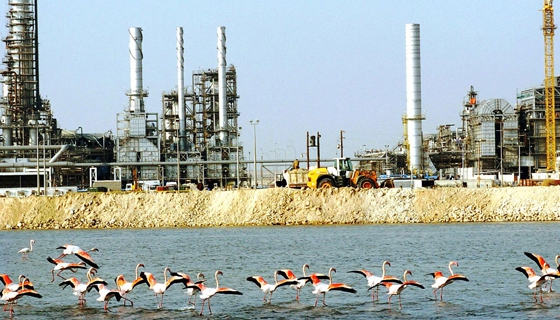Against a backdrop of weaker hydrocarbons prices, Bahrain is stepping up counter-cyclical downstream investments aimed at boosting energy and economic security.
In mid-October Abdul Hussain bin Ali Mirza, minister of energy and chairman of Tatweer Petroleum, said a contract for a floating liquefied natural gas (LNG) terminal to handle and process gas imports on the island would be awarded by the end of the year.
Specifications
According to the minister, the $400m terminal – which will be located near Khalifa Bin Salman Port, the country’s main maritime hub – will be brought online by early 2018, helping to ensure Bahrain’s long-term energy security.
“This will allow us to import 400m standard cu feet of gas per day (scfd) with flexibility to expand it to 800m scfd,” Mirza told local media in October. “This will be a complete solution for Bahrain’s gas requirements, and the country will never be short on the quantity of gas needed.”
The new LNG terminal will also provide Bahrain with greater flexibility in terms of sourcing gas imports. As opposed to being tied to a single provider, LNG can be purchased on the open market, allowing the country to take advantage of favourable price fluctuations and reduce the likelihood of supply disruptions.
Other approaches
Mounting demand for natural gas largely stems from the country’s growing industrial base, anchored by aluminium and petrochemicals production – both of which require natural gas for fuel and feedstock.
In the past Bahrain has considered several options to meet rising needs, including separate proposed pipelines with Iran and Qatar, though neither has progressed beyond the planning stages. This was due in part to the moratorium declared on further development of Qatar’s North field, which will run through at least the end of 2015.
In a bid to curb dependency on imports, the kingdom is also working to maximise domestic production, with Tatweer Petroleum recently enlisting the services of UK-based oilfield services provider Petrofac to supply a new gas dehydration facility.
The first in a series of capacity projects planned over the next five years, the $100m plant will have the capacity to process 500m scfd, with gas sourced from Bahrain’s own reserves.
Using enhanced extraction technology, Tatweer is working to redevelop the Bahrain Field to boost production levels and allow for greater domestic contribution to the national energy grid. Discovered in 1932, Bahrain Field remains the kingdom’s largest reserve, with production averaging around 50,000 bpd in 2015, according to Mirza, the highest level recorded since the mid-1970s.
Fuel supply to drive refinery expansion
With plans already under way to optimise its natural gas supply, Bahrain is making a similar move to secure oil and expand local processing capacity.
In mid-September construction contracts valued at $300m were signed for a new 115-km pipeline carrying oil from Aramco's Abqaiq plant on the Saudi mainland to Bahrain. The new channel, which is set to replace the existing pipeline in the first quarter of 2018, will have a throughput capacity of up to 400,000 barrels per day (bpd), according to Mirza – a more than 50% increase.
With an increased flow of oil from Saudi Arabia, Bahrain is expected to move ahead on another key energy project: expansion of the Sitra crude refinery.
Currently operating at its full capacity of 260,000 bpd, the Sitra facility is set to undergo a $5bn upgrade and intended to boost output to at least 360,000 bpd.
The front-end engineering and design components of the project, which have already been awarded, are scheduled to be completed early next year, with the plant tentatively expected to come on-line in 2019, allowing Bahrain to make full use of the increased Saudi oil exports supplied by the new pipeline.
While substantial, this latest round of investment in downstream energy represents a scaling back of the government’s earlier announcement in 2012, which revealed plans for a $6bn-10bn financial injection intended to increase Sitra’s refining capacity to more than 400,000 bpd.
Oxford Business Group
17 November

























































